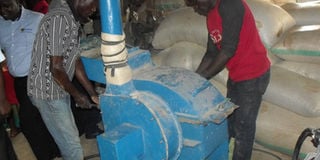Prime
Kalangala farmers get mills to boost maize, rice production

One of the machines being operated in Kalangala Town. PHOTO BY HENRY LUBULWA
Farmers in Kalangala District have received milling machines to boost their production of and value addition to maize, rice and silver fish (mukene).
The maize mill was delivered to farmers in Kalangala Town Council area while the rice and silver fish processors were donated to residents in Bufumira Sub County last week.
Gideon Buko, the coordinator, Kalangala District Farmers Forum, noted that the maize mill will aid value addition through processing of flour and bran. It is able to process three tonnes of maize in five hours.
“This is value addition. We want to have maize grown in Kalangala District processed into products for market,” he said.
Kalangala consumes 117 tonnes of maize every month according to David Balironda, the district production officer.
However, the flour consumed has always been bought from Masaka and Mpigi districts.
“This in turn doesn’t make sense to people who grow maize and sell it to mills in other district at a lesser price. We want to add value to what we produce in the district,” he observed.
A kilo of flour is Shs1,500 in Kalangala district while a kilo of maize is Shs400.
Farmers on the islands of Bufumira, Bubeke and Bukasa grow rice. But it always sold off at a cheaper price on the mainland as it is unprocessed.
Kalangala District is gradually increasing its agricultural production. A case in point is plantation agriculture with oil palm on Bugala, the largest island.
Before the introduction of oil palm in 2008, a significant part of the population mainly depended on fishing. However, the catches in Lake Victoria have since been declining.
Other farming activities cover both crop production and livestock rearing.
Currently, the district produces maize, rice, bananas, milk, goats and coffee for commercial purposes.




